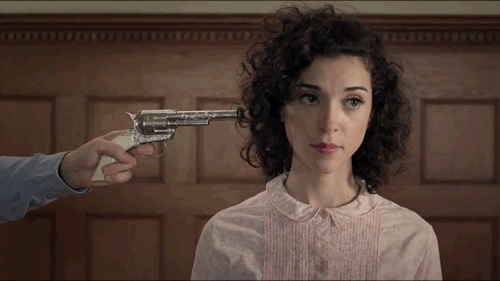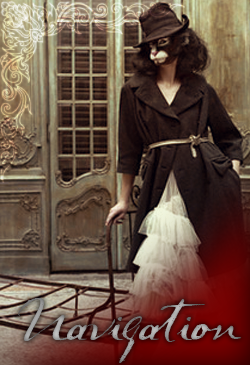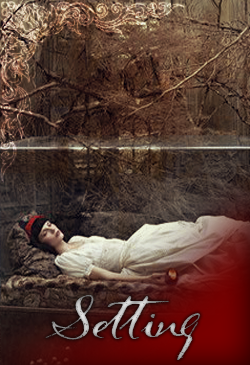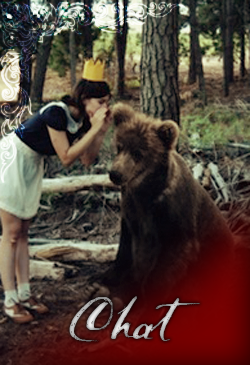Post by DR. EDITH ALLINGHAM on Sept 28, 2011 21:03:44 GMT -5
...edith christine allingham*
*The game is afoot!*
[/size]*The game is afoot!*


...basics*
name Edith Christine Allingham (That is ALL-ing-um, thank you.) Her father, a historian, chose her middle name after Christine di Pisan, an incredibly accomplished woman of the Renaissance.
nickname Edie, please. Or Dr. Allingham.
age 27
gender Female, clearly.
occupation English teacher at Baum Academy – she teaches Advanced Placement English for 11th and 12th grade.
hometown She was born in London, England, but has traveled around so much that her accent has become almost indiscernable.
sexuality Who even knows.
personification Sherlock Holmes
status Dormant?
face claim Annie Clark (St. Vincent)
...appearance*
hair color Dark brown. Her hair is naturally rather coarse in texture and becomes very curly when it gets much longer than her shoulders; pre-shoulders, it is very wavy. It always seems to be a complete and utter mess.
eye color Dark brown. Her eyes tend to sparkle in the light despite being so dark.
build Petite, but sturdy. Not a pronounced bust, but strong, if narrow, hips and legs.
height 5’3
clothing style Quirky. That’s all that can be said for it. It’s erratic, but she tends to dress in more vintage or old-fashioned clothes. She also has a fondness for scarves and long overcoats. Her favorite of the latter is maroon.
distinctive traits A very eloquent manner of speaking with a rather unidentifiable accent, nimble fingers, and slightly olive-colored skin.
...personal*
personality
Edie Allingham has always been described accurately in one word: “idiosyncratic.” She is the kind of woman that people look twice at and wonder if she’s serious. The best part: she always is. Edie is completely content with being wildly eccentric and hardly notices it anymore. For instance, she doesn’t find her erratic style of dress, tendency to smoke old pipes, or downright obsession with logic puzzles to be strange at all; she has grown so accustomed to her numerous quirks and peculiarities that they do not even register as odd with her. Because of this indifference to the occasional strangeness of her behavior, she is free to be as positively wacky as she pleases without fearing the social consequences, simply because she has no sense of shame about her behavior.
Indeed, it is safe to say that Edie is shameless; however, it is unfair to assume that she has no manners. Edith is, in fact, eloquent, polite, and always exceptionally composed. Despite being genuine and completely brazen about who she is as a person with no attempts to hide it, she does have a sense of self-control. She is honest about herself, but she does not allow her oddness to dominate her life, her career, or her (few) personal relationships. She simply makes no move to hide them. Edie is also very frank about her abilities and limitations: she recognizes, for instance, that she is significantly smarter than everyone else, but also realizes that she is socially a bit weaker than most.
Well-educated and intelligent, Edie speaks several languages at least conversationally, including Polish (her mother’s native tongue), French, Spanish, Italian, German, and Russian. She is very serious about literature (hence her chosen career as an English teacher), and loves nothing more than to sit in a large armchair with a cup of tea and a pen and annotate an enormous Russian novel. She loves classical music, particularly Haydn and Vivaldi, and plays the violin quite proficiently – she has dabbled in composing, but is not eager to share her creations with the world. Art is also a fondness of hers, and she spends much of her time in galleries. In general, she is the quintessential Renaissance woman when it comes to the arts, and she has a very firm grasp of history. Her grammar is impeccable and she speaks Queen’s English at all times, though her fondness for grammar often leads her to correct others whose grammar is not up to snuff. She is very fond of quotations and must have the last words of fifty different authors committed to memory. Also talented in maths and sciences, Edie is capable of high-level calculations and often performs her own scientific experiments in the comfort of her own home, as dangerous as that probably is. (She has little sense of danger.)
There are no two ways about it: Edie is a genius. The amount of information in her head is practically limitless, and she is constantly observing, calculating, and analyzing. For instance, despite being somewhat small in stature, she is perfectly capable of taking down a fully grown man attempting to attack her, simply by observing his movements, targeting his weak spots, and exploiting them before he gets the chance to harm her. The rate at which she absorbs information and commits it to memory is absurdly fast. She is an avid debater, a philosopher, and a serious intellectual; her theories are often groundbreaking, and it’s surprising that she has not gained more recognition as of yet. As a hobby, she also does private detective work outside of school, and she is very good at it. Her deduction skills are impeccable, and she is a logical, creative, critical thinker who loves the concepts of possibility and innovation.
However, for all her virtues, she also has her faults. Though, again, she is very honest with herself about her strengths and weaknesses, her superior intelligence makes her feel...well, superior. She has a tendency to be condescending and proud towards others – not overtly arrogant, but simply removed, with an aura of distinct intellectual dominance. She dislikes being told what to do or how to do it by people she believes to be less intelligent than she is, which manifested itself in her younger years into a serious authority problem. That same distaste for being instructed by the less intelligent has stuck with her today. If she is in such a situation, she will often become snarky, catty, or downright rude with the person trying to tell her what’s what, and often simply won’t comply. This has gotten her fired from several jobs in the past, but she seems to have an amiable enough relationship with the principal and administrators at Baum that she’s stayed out of trouble insofar. As this trait reveals, Edie is stubborn almost to the point of absurdity, and very keen on having everything her way.
Edie is a perfectionist. If it isn’t absolutely flawless, it isn’t right and deserves to be done over. She is infuriatingly picky and is stuck in her habits, as strange as they tend to be. She tends to be critical of others, as well, usually out loud but often in a way so subtle and complex that a less intelligent subject of her ridicule probably wouldn’t be able to understand her insult. She is cynical, clever, and witty, very good with words, and when it suits her interests, she is capable of very good acting. However, to those who do not know her (and even to some that do), her demeanor tends to be a slightly cold and intimidating one. Even some of her students find her unapproachable. Though opinionated, she is quiet and rarely yells; she is fond of a peaceful atmosphere.
Lastly, Edith rarely displays her emotions openly. Emotion is something that is difficult for her to understand, because it cannot be explained scientifically or mathematically. She is more than capable of identifying it in others, but rarely expresses or understands her own emotions.
past
When Rupert Allingham, a young aspiring historian from Britain, met Polish writer Benedykta Walczak during his travels, he was struck with her. She was 30, a refined member of the European intelligentsia, and he was 22, British, and working on his master’s degree. He became infatuated with her, though the elder Benedykta took no notice of him; she turned him down when he asked her out many times, thinking him below her. She also didn’t think she had time for relationships, seeing as she was writing what would become her bestselling book.
So Rupert, taking the hint, dropped his attempts for a while. He refocused himself on his studies and worked his way up to a Ph.D. in History. Though he ran into Benedykta several times in his travels as he became more and more immersed in the intellectual circles in Europe and around the world, he made no move to court her, not until he had authored two books and had a steady job as a historian at a prestigious British university. Then, he did seek her out, he now 34 and she 42 (but still radiant in Rupert’s eyes). This time, Benedykta, who had settled down a bit herself, was effectively wooed by Rupert, and the two of them were wed within a few months.
At the age of 43, Benedykta became pregnant. The two parents, neither of whom had ever had a child before, were both excited and nervous; as Benedykta was an older mother, there was a high risk of complications in the pregnancy. However, on April 16th, in a hospital in London, they had a perfectly healthy little daughter, whom they named Edith Christine.
As both of her parents were very successful and worldly, Edith was traveling around the world before she could even speak. She was immersed in the culture of different countries from a very early age. She learned English from her father and Polish from her mother, and she learned to read and speak very quickly. From an early age, it was clear to the Allinghams that their daughter, whom they affectionately called Edie, was incredibly intelligent. Since they moved so often, Edie was usually homeschooled by her two brilliant parents in a low-stress but high-standards environment. That may seem contradictory, but one must remember how intelligent little Edie was; meeting her parents’ standards was not difficult for her with a little effort.
Edith grew up in so many different countries that her accent became an indiscernible mix, something between Polish, English, and American. Her father taught her Queen’s English, and she became just as stubborn about grammar as he was. In fact, Edith took largely after her father in her analytical prowess and perfectionism, though her creativity (and general appearance) came from her mother. She was never deemed quite as attractive as the stately Benedykta, but she never took that to heart. Edith knew from the start that she was who she was, and nothing could change that.
Since Edith traveled so much, she didn’t have many friends growing up, doing most of her socializing with her parents’ adult friends. This suited her just fine, as she preferred the intelligent debates she had with the adults to the trite, fleeting conversations she occasionally had with her peers. However, it did alienate her from children her own age. She was so bright and so foreign that most of her classmates didn’t want much to do with her – and that was fine with Edie, since she didn’t want much to do with them, either. She was introverted, and anyway, she was much smarter than they were.
Everything seemed to be going well in Edie's life, apart from some troublemaking in school initiated by her own boredom. Then, her father made a mistake.
At the age of 41, very tired and very intoxicated, Rupert Allingham cheated on his wife.
Vanessa Hemsworth, the root of all Edith's troubles in the world, was a recently-fired reality TV star, come to London to exploit the last remnants of her youth. She bought Rupert drink after drink after drink, and he fell into her snare.
He was gone by noon, spilling a barrage of half-formed excuses, and he returned to his wife stricken with guilt. He hoped desperately that the whole thing would just go away, that it was a bad dream, but he found that he could no longer look Benedykta in the eye with the knowledge of what he had done weighing on his shoulders. However, the lack of contact from Vanessa was reassuring, and about seven months to the day of the affair, he had nearly cleared his conscience of the whole thing.
And then, two months after that point, Vanessa showed up on the Allinghams' doorstep.
There were tears, there were yells, and there were more tears, and little Edie didn't really understand any of it. Though at the age of six she was already analyzing Victorian literature and completing logic puzzles intended for adults, she had yet to grasp the complex and - from Edie's perspective to this day - completely illogical realm of emotions. Her mother was in tears, the strange woman was in tears, and there was that odd little bundle that could be nothing but a baby. But what was the baby doing here? And who was the lady?
What she gathered from close observation of the disturbing scene was that her father had engaged in intercourse with a woman who was not her mother, thus producing the baby and upsetting Benedykta. Edith didn't really understand the concept of cheating in a relationship, but she knew that cheating on a test was very bad, so cheating of any sort must be bad, as well. Just as she was hoping that the strange lady would just go away and make her mother stop crying, it seemed some sort of arrangement was made, and the lady left...without the baby.
Edie was incredibly confused and hurt. She had been the only child of the family for the six years of her life that she had lived, and she was not eager to share her parents - both of whom she was very close to - with some baby, an annoying thing that she knew would take up her parents' time, money, and attention. So from the moment she learned that her parents themselves had named the child Caden, Edith Christine Allingham hated her half-brother.
It was for this reason that she fought to be better than him from the start, to gain more attention, more accolades. She liked to think that, despite the fact that their parents' attention was now divided between two children, she still had the upper hand, as she was the family's "real" daughter, whereas Caden was an intruder. She felt that he had no right to live under the same roof as her, and she was especially jealous about her mother, who eventually grew to see Caden as her own son. Edie devised plans and schemes to keep her mother's focus on her and not on Caden, using her adult intelligence to fulfill her childish desires. As soon as Caden could speak, the two of them were in constant competition, particiularly when it came to their homeschooling - they would compete for the higher grades, the fastest-solved math problem, the longest recitation, the biggest novel read. Edie would never have recognized it or admitted it, but her competition with Caden only sharpened her abilities further as she strove for excellence - and most likely Caden's as well.
Her half-brother was diagnosed with fibromyalgia at an early age, a condition that kept him inside most of the time while other children played. Edith did not like this, either, for she had always preferred to play inside; she didn't like other children, and other children didn't like her. However, not wishing to be around Caden, she would often make up mysteries and go outside on adventures to solve them, if only to avoid staying inside.
Edith attended Oxford for college, departing for the university at the age of 18, while Caden was 12. It was also in this year, at the age of 53, that Rupert Allingham passed away of an abrupt respiratory infection. Edie was crushed, and her grades briefly dipped from 100's to barely 95's as she struggled her way through the realization that her father, who had taught her, nurtured her, loved her, and protected her, was gone. It was the first serious emotional strife she had ever experienced, and she didn't know how to deal with it. For a time, she shut down entirely and wanted to see no-one; eventually, she came to see her mother, but discovered Benedykta, stuck at home with a child who was not hers, was in an even worse state than her daughter. Edith didn't know how to deal with that, either.
Unsure what to do with herself now that her family was in ruins, Edie threw herself back into her schoolwork at Oxford. She studied abroad for a semester in Vienna. She earned her doctorate at the startlingly young age of 23. When her studies were complete, she began to search for something new and interesting to do with her time, now that Caden was out of her hair. She also wanted to get away from her mother, whose mental health had so deteriorated that she had had to move in with Edith's aunt. Edith wanted nothing to do with her mother from that point on, largely because the idea of seeing her regal mother in such a state made her uncomfortable. And when Edie was uncomfortable, she tended to avoid the object of her discomfort.
Eventually, this avoidance and search for something new brought her to New York City. She had been there several times during her life, but never for an extended period, and she decided that the hustle and bustle of the Big Apple might be a nice change. She purchased a small apartment for herself, and, after some consideration, took a job as a high school English teacher at Baum Academy, for no better reason than the fact that she enjoyed literature, and thought she might as well tell these silly teenagers what was what. She was certain that whatever crap they were feeding them was not up to her standards, and she planned to change that.
present
Now a teacher at Frank L. Baum Academy, Dr. Allingham teaches the advanced English courses for juniors and seniors. She is known to be strict and no-nonsense, but also very unconventional, with interesting and fun new project ideas and class activities. Unruly students tend not to like her because she takes no mercy on those who act out, but the students who pay attention in her class and enjoy the study of English often find her to be wonderfully inspiring.
She lives on her own, though she probably shouldn’t, seeing as her odd habits often lead her to reclusive or possibly hazardous behavior. A lot of her free time is spent reading or playing the violin, and she finds she is always longing for a new challenge. As romance goes, she doesn’t seem to possess the need for it, as she’s been quite happily single all her life. She owns a King Snake named Aristophanes, named after her favorite Greek playwright, and she believes that he provides her all the company she requires.
family
Rupert Allingham, father, historian, deceased
Benedykta Allingham [nee. Walczak], mother, writer, 70
Kaden Allingham-Hemsworth, half-brother, 21
likes
Travel
Literature
Unconventional things
MYSTERIES!
Knowledge and learning
Reading
Classical literature (pre-1950 is preferable)
Writing
Meditation
Potatoes. She has always been fond of potatoes.
Violin and classical music (her favorite composer is Haydn)
Tea
Snakes
Drugs (but only on occasion, she’s no addict)
Smoking (she also collects old pipes)
Logical deduction puzzles
Crossword puzzles
Jigsaw puzzles
Really any kind of puzzles
In fact, really any kind of intellectual stimulation is probably good.
dislikes
Politics
Fashion
Idiots
Things that are too easy
Herd mentality
Boring things
Rules
Gender identity
Technology
Convention
Cats and dogs (she is allergic to pet dander, hence her choice of a snake as a pet)
Too much light
The beach
Public places
Fantasy
Most music produced after 1919
Trashy romance novels (They make her want to eat her own throat out.)
Her own face
Short skirts
High heels
Very, very tall people
When her motives are questioned
other notes If she greets you at the door with Aristophanes draped over her shoulders, don’t scream. She’ll slam the door in your face.
...literature*
book title The Adventures of Sherlock Holmes by Sir Arthur Conan Doyle
backstory Sherlock Holmes, the iconic detective figure, is the “star” of Doyle’s series of books, though he is not the narrator. Along with his sidekick, Dr. John Watson, Holmes takes on the toughest mysteries around and often solves what initially seems unsolvable. Somewhat of an eccentric genius, in the majority of his incarnations, he remains calm the majority of the time. He is known for assisting (and often showing up) the detectives at Scotland Yard, and lives in a house on Baker Street, where Mrs. Hudson, the landlady, is forced to deal with his idiosyncratic tendencies. He plays the violin, often smokes a pipe, and apparently shoots up cocaine in order to enhance his intellectual capabilities. His rival is Dr. Moriarty.
...roleplayer*
name Zelda
age Zelda
gender Zelda
rp experience Zelda
how you found ouac Zelda
rp sample ZELDA











